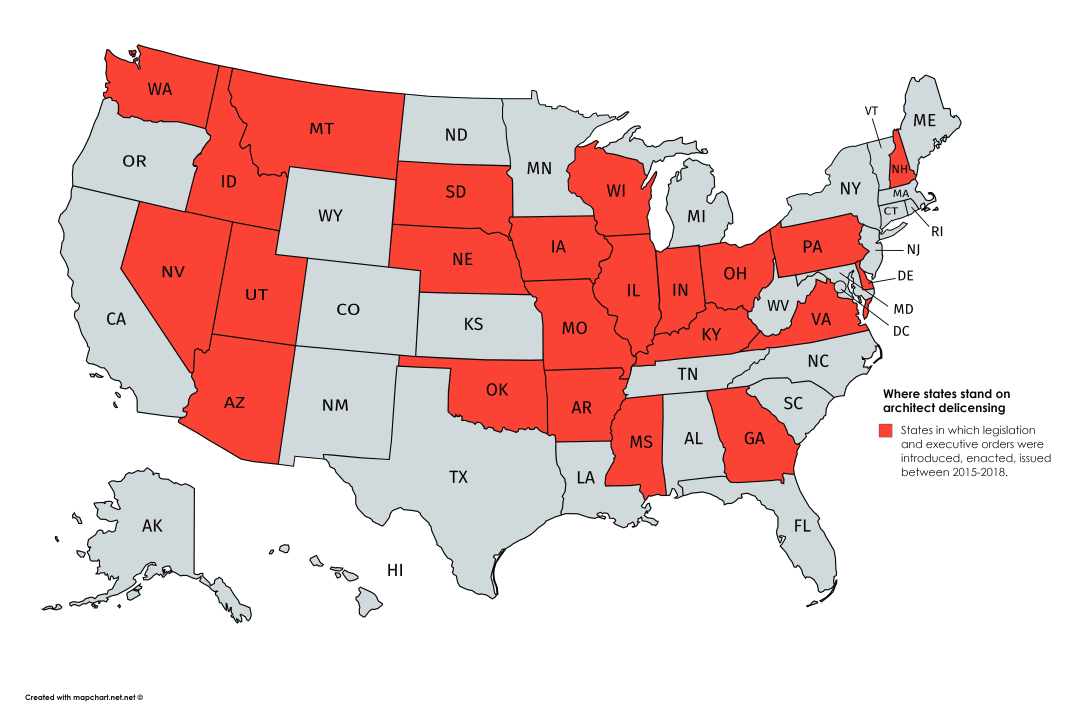by: Adam Roberts
The past few years have seen an increasing level of pressure on workers organizations, including unions and professional associations such as AIA. These attacks are being led by a few very wealthy individuals, most notably the Koch brothers and their network of donors. To these opponents of unions and professional associations, the limits that are placed on employment, such as licensure, are violations of basic freedoms enshrined in the Constitution.
As an example, the description of an anti-licensure event hosted by the Charles Koch Institute reads:
Once a rarely talked about issue, occupational licensing is becoming a mainstream target of reform… the average license in New Hampshire requires 230 days of training, $209 in fees, and two exams. For so many, particularly those looking to start or switch their careers, these costs prevent entry and stifle opportunity.
The Koch brothers and their supporters believe that licenses limit the free market by keeping out those without the necessary resources to get a license. These claims have gained momentum, particularly in states with Republican-controlled legislatures.
In response to these attacks, AIA released a statement illustrating the importance of licensure to public safety, as licensure ensures that those who practice have been deemed qualified to do so. While New York is a generally pro-licensure state, the extent of licensure assaults in other nearby states indicates that threats still linger. This map from AIA shows the states in which legislation and executive orders were introduced, enacted, or issued from 2015 through 2018 putting limits on architecture licensure.
Another front in the Koch brothers’ attacks on unions and professional organizations comes in the form of fees. In the US Supreme Court Case Janus v. AFSCME, a legal challenge is being presented to the collection of “fair share” fees in government workplaces. Fair share fees are collected by unions from non-members in exchange for representation. These fees are required but cannot go towards political activities, only towards internal union organizing. Nonetheless, opponents of fair share fees claim they indirectly support the political positions of unions, which limits the free speech of those who do not agree with those positions.
The fear among union members is that their coworkers will stop paying fair share fees en masse, putting increasing pressure on their own dues to cover “free riders.” With so many people demanding union representation without paying, the organizing ability of unions will be significantly diminished.
For the hundreds of AIANY public sector workers, this represents a potentially serious threat to their livelihood. AIANY is in communications with those unions representing our members and will be a source of information to help alleviate any concerns about changes to the workplace that Janus may bring.
Pulse Points:
- On Friday, April 20 at 1:00 PM, the City Club of New York is hosting an event entitled “A Panel on New York City’s Regional Rail Service” with speakers Jim Venturi (ReThinkNYC), George Haikalis (Institute for Rational Urban Mobility), and Rich Barone (Regional Plan Association). Click here to register.
- On Tuesday, May 8, from 9:00 AM – 5:00 PM, the Waterfront Alliance will be hosting its 2018 Waterfront Conference. This year’s theme, “Cities on the Edge,” explores political responses to climate change in coastal cities. More information on the event and registration can be found here.








